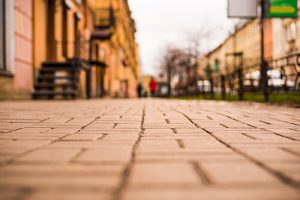Premises Liability: More Useful Facts about Sidewalk Accidents
Posted September 22nd, 2016 by Anthony Carbone, PC.
Categories: Premises Liability.
 You may have heard the term premises liability. However, you may not totally understand its significance. If you’ve slipped/tripped and fallen on a sidewalk, your claim is based on the concept of premises liability. In short, it will be necessary to prove that a property owner’s negligence caused your personal injuries.
You may have heard the term premises liability. However, you may not totally understand its significance. If you’ve slipped/tripped and fallen on a sidewalk, your claim is based on the concept of premises liability. In short, it will be necessary to prove that a property owner’s negligence caused your personal injuries.
In our first article concerning sidewalk accidents, we discussed the culpability of residential property owners when it comes to property abutting public sidewalks. There are obviously many other premises liability cases that concern slipping or tripping on sidewalks.
Sidewalk Accidents and Public Entities
We’ve written before about claims against public entities. If you’ve fallen on a public sidewalk, it will be important to determine if a governmental agency could be liable. Local municipalities fall under this classification. We cannot stress enough the importance of seeking an experienced premises liability attorney sooner than later. There are more stringent time limitations for matters involving public entities.
NJSA 59:4-2 provides general information concerning claims against a governmental agency. In order to pursue a claim for a slip and fall accident against a public entity, the following must be proven:
- Property must be in a dangerous condition
- The precarious situation must have caused the personal injuries
- The public entity knew or should have known of the risk associated with the dangerous condition
- Governmental agency must have caused the dangerous condition, and/or
- Public entity did not attempt to fix situation within a reasonable time frame
Premises Liability Claims for Sidewalks Abutting Commercial Property
Could a commercial property owner bear some responsibility for injuries sustained in your slip and fall accident? A New Jersey Supreme court decision says yes. Commercial landowners have certain responsibilities when it comes to providing safe access to public sidewalks.
The language of the aforementioned Supreme Court decision puts it quite simply: “Commercial property owners are henceforth liable for injuries on the sidewalks abutting their property that are caused by their negligent failure to maintain the sidewalks in reasonably good condition.”
It is obvious that pedestrians have a right to expect a safe passageway. Obviously, commercial property owners have some advantages when it comes to sidewalks abutting their property. They should be most familiar with the area near their premises.
Commercial property owners also have some benefits, as sidewalks are a means for people entering and exiting their premises. It, therefore, makes sense that they have some accountability for the proper maintenance and repair of sidewalks abutting their property.
More Facts Concerning Sidewalk Accidents and Premises Liability
We have only touched the surface concerning premises liability claims and sidewalk accidents. The law is different when it comes to accidents occurring on property owned by charitable organizations. Claims against condominium complexes have also been considered by the courts. Again, this is the reason to seek legal advice from an experienced personal injury attorney to determine your legal course of action.
Slip and fall accidents on sidewalks occur for a multitude of reasons. Dangerous conditions may occur because the area was in need of repair. Snow and ice removal may be an issue. A property owner’s failure to remove debris may cause someone to trip and fall. Likewise, someone may suffer injuries from a sidewalk raised by tree roots. The list goes on.
Contact Us
Have you been injured on a sidewalk and need legal advice? The Law Offices of Anthony Carbone has handled these types of premises liability claims for over twenty-five years. We have the experience and resources to pursue compensation on your behalf. There is no cost to meet with one of our attorneys. Contact us.


